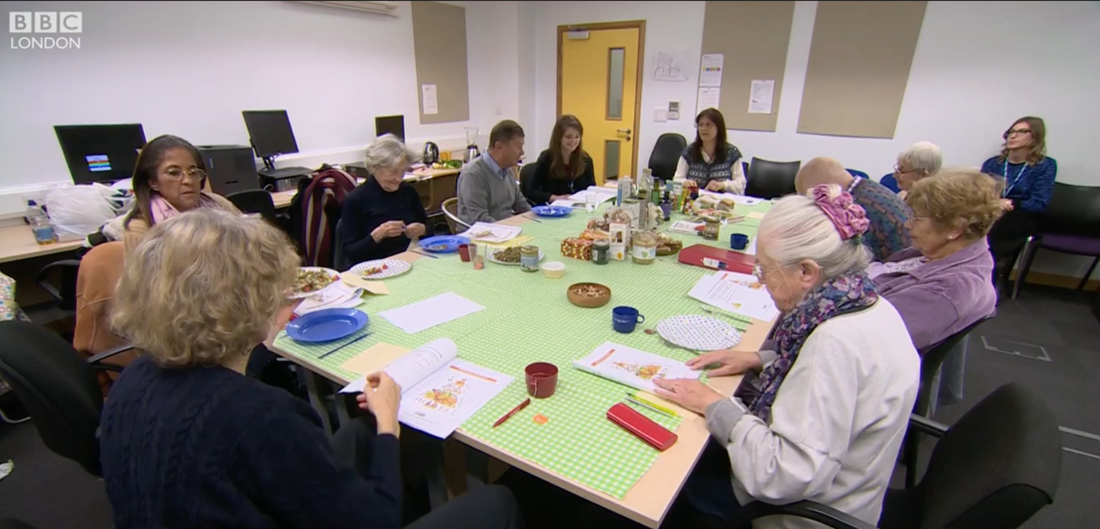BRAINFOOD SESSIONS AS FEATURED ON BBC LONDON (DEC 2016)

Referenced as an innovation by the Cavendish Square Group which supports and connects innovations by mental health trusts members across London, "The Brain Food project was the idea of Anna Betz, a lead practitioner which with the Camden Memory Service, who has been working with Dr Claudia Cooper, a Camden Memory Service consultant and UCL researcher. Anna holds a series of five workshops three or four times a year for service users to experiment with different foods and to experience the benefits on their health."
The sessions are sensory rich experiences that persuade people by inspiring them, rather than telling them, to make small changes that have real impact.
One service user with a dementia diagnosis, who adopted the new way of eating, found her scores on the memory test improved and then stayed the same over the next two years. Others have improved their cholesterol levels and generally feel that they have more energy.
Dr Cooper, whose team is now working with University College London on carrying out research into the effect of the Brain Food project, said: “People with dementia are at high risk of malnutrition so diet is really important to think about when caring for them.”
The title of the study is Evaluating Brain food groups for memory service clients . It is a preliminary mixed methodology study open to participating Brainfood groups. If you are interested in participating do get in touch by sending a message to Dr.Claudia Cooper at UCL.
The sessions are sensory rich experiences that persuade people by inspiring them, rather than telling them, to make small changes that have real impact.
One service user with a dementia diagnosis, who adopted the new way of eating, found her scores on the memory test improved and then stayed the same over the next two years. Others have improved their cholesterol levels and generally feel that they have more energy.
Dr Cooper, whose team is now working with University College London on carrying out research into the effect of the Brain Food project, said: “People with dementia are at high risk of malnutrition so diet is really important to think about when caring for them.”
The title of the study is Evaluating Brain food groups for memory service clients . It is a preliminary mixed methodology study open to participating Brainfood groups. If you are interested in participating do get in touch by sending a message to Dr.Claudia Cooper at UCL.
The Brainfood workshops are offered as a series of manualised and highly interactive workshops to help patients with a diagnosis of SCI (Subjective Cognitive Impairment), MCI (Mild Cognitive Impairment) or early dementia.
The workshops which are a multi-aspect intervention, addressing primarily nutrition, but also stress, tiredness, sleep, exercise and general physical health. They are presently offered to patients and their relatives or carers via NHS Memory Services. Relatives and carers are encouraged to participate together since changing dietary habits benefit from the support of those with an interest in our wellbeing.
You can watch the whole BBC video here.
If you or one of your relatives has a diagnosis of SMI, MCI or Dementia you can suggest to your Memory Service to get in touch with us and discuss how this programme could be offered by their service.
NHS Memory Services in Redbridge and Hounslow have adopted this programme for their patients.
The workshops which are a multi-aspect intervention, addressing primarily nutrition, but also stress, tiredness, sleep, exercise and general physical health. They are presently offered to patients and their relatives or carers via NHS Memory Services. Relatives and carers are encouraged to participate together since changing dietary habits benefit from the support of those with an interest in our wellbeing.
You can watch the whole BBC video here.
If you or one of your relatives has a diagnosis of SMI, MCI or Dementia you can suggest to your Memory Service to get in touch with us and discuss how this programme could be offered by their service.
NHS Memory Services in Redbridge and Hounslow have adopted this programme for their patients.
UCL video interviews with patients and their relatives:
Jill and Caroline - https://vimeo.com/200803914
Alan and Rachael - https://vimeo.com/200803249
Jill and Caroline - https://vimeo.com/200803914
Alan and Rachael - https://vimeo.com/200803249
| evaluating_brainfood_groups_2017.pdf | |
| File Size: | 1412 kb |
| File Type: | |
I have also been trained in the Bredesen protocol for dementia by Cytoplan and offer public talks and workshops. For more details see here.
References:
Evidence for the impact of nutrition and multi-therapeutic interventions:
The Finger trial:
Findings from this large, long-term, randomised controlled trial suggest that a multidomain intervention could improve or maintain cognitive functioning in at-risk elderly people from the general population
http://www.thelancet.com/journals/lancet/article/PIIS0140-6736(15)60461-5/abstract
https://www.ncbi.nlm.nih.gov/pubmed/23332672
Systemic review by Exeter University
https://www.exeter.ac.uk/news/featurednews/title_317578_en.html
Reversal of cognitive decline: A novel therapeutic program
This report describes a novel, comprehensive, and personalized therapeutic program that is based on the underlying pathogenesis of Alzheimer's disease, and which involves multiple modalities designed to achieve metabolic enhancement for neurodegeneration (MEND). The first 10 patients who have utilized this program include patients with memory loss associated with Alzheimer's disease (AD), amnestic mild cognitive impairment (aMCI), or subjective cognitive impairment (SCI).
